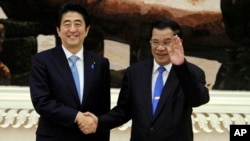WASHINGTON DC - Japan’s prime minister failed to address major issues, by leaving aside Cambodia’s political deadlock and its poor human rights record on a visit last week, rights activists say.
“It was a missed opportunity for the government of Japan, which has a great deal of leverage with the Cambodian government because of its large aid budget,” said Phil Robertson, deputy director of Human Rights Watch’s Asia division.
Prime Minister Shinzo Abe visited Cambodia last weekend, vowing financial support to Prime Minister Hun Sen to help promote human rights and democracy.
But he did not discuss the results of July’s election, which the opposition Cambodia National Rescue Party has rejected.
Government spokesman Phay Siphan said politics should be “placed away from people’s social welfare,” and that Japan’s stance in supporting Cambodia was “clear.”
“We all should understand that we have just walked out of war, and we need support from every corner,” he said.
Peter Tan Keo, an independent analyst in the US, told VOA Khmer that Japan’s stance appeared to be support for reform of Cambodia’s electoral system for future elections, rather than to address problems with the past election.
“When they congratulate the government without really trying to find an alternative to solve the political stalemate, that raises a lot of questions,” he said. “When people go out and they cast their votes, and the people are demanding transparency, particularly with the regard to the electoral process, and there is no transparency, then that affects the democratic process,” he said.
John Ciorciari, a professor of public policy at the University of Michigan, said Japan has taken many steps to encourage democracy and the rule of law in Cambodia. “But like most external powers, its diplomacy in Southeast Asia is guided primarily by its conceptions of its own national interest,” he said.
Abe encourage reforms and peaceful resolutions to political problems, and he did not explicitly endorse the outcome of July’s elections, Ciorciari said. “However, his visit and pledge to keep aid flowing to Cambodia—including aid on electoral reform—amount to an implicit recognition of the new government.”
That could mean less pressure on the ruling Cambodian People’s Party, while leaving many supporters of the opposition “disappointed,” he said. But Japan has regional concerns, he said.
“Abe’s trip to Phnom Penh is part of Japan’s latest diplomatic surge in the region—a surge motivated primarily by concerns about China,” he said. “Japan is particularly concerned about Chinese influence in Cambodia, which has supported Beijing in Asean discussions on the South China Sea. The visit to Phnom Penh is quite consistent with Japan’s long-term strategy of coupling aid with political engagement to develop influence in Southeast Asia.”
Japan’s Premier Criticized After Visiting Cambodia
- Sok Khemara
- VOA Khmer




